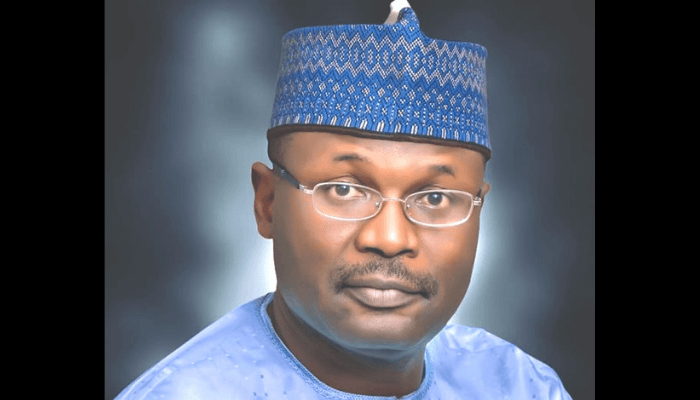Remembering Yakubu’s innovations at resetting election conduct in Nigeria
After ten years in the saddle, Yakubu Mahmood recently bowed out of office as the head of Nigeria’s electoral Commission, the Independence National Electoral Commission (INEC), leaving a legacy that many would talk about for a while.
Since leaving office about two weeks ago, opinions have been divided about his impact and performance ad chairman of INEC.
But many political stakeholders have commended Yakubu for his work at resetting the conduct of elections and introducing several initiatives for such a process in the last one decade.
One of those commendations is from President Bola Tinubu who conferred upon him the national honour of Commander of the Order of the Niger.
Read also: Will history judge ex-INEC chairman, Mahmood Yakubu, kindly or harshly?
During his tenure, Yakubu presided over some of the most complex elections in the country’s Fourth Republic, including the 2019 and 2023 general elections, over 18 off-cycle governorship polls, and hundreds of supplementary, rerun, and bye-elections.
Since 2015, the outgone INEC Chairman worked with 24 National Commissioners and 67 Resident Electoral Commissioners.
Perhaps, the most defining legacy of Yakubu’s tenure is the institutionalisation of electoral reforms and the introduction of technology in the country’s voting.
Among the key innovation that the professor introduced to improve the conduct of election in Nigeria are;
Electoral Act 2022
One of the biggest turning points under his leadership was the signing of the Electoral Act 2022, which empowered INEC to use technology more decisively. It introduced provisions for early release of election funds, improved timelines for party primaries, and clarified the roles of INEC in supervising intra-party affairs. The Act also removed ambiguities surrounding tenure for FCT Area Council Chairmen and Councillors — matters that often ended up in court.
Read also: Why I decided to bow out of INEC – Yakubu
INEC Result Viewing Portal
Another watershed moment was the launch of the INEC Result Viewing Portal— a platform that enabled the real-time upload of polling unit results. First used widely in 2020, IReV was designed to enhance transparency and public trust in electoral outcomes. Although its implementation was not without hitches — especially during the 2023 general elections — it marked a leap in the commission’s digital evolution.
Regularisation of Election Dates
Prior to Professor Yakubu’s tenure, generals were not regular. He regularised the dates of general elections and FCT Area Council Elections.
The general election now is held on the third Saturday in February of election year for the presidential and National Assembly election, and two weeks later for the governorship and state elections. This has made it possible for all stakeholders to plan well ahead of time ensure better coordination and readiness by the commission, prepare for election, and for the Continuous Accreditation
The Commission under the leadership of Yakubu introduced the Continuous Accreditation and Voting System (CAVS) to replace the cumbersome process of first completing accreditation before voting.
CAVS simplified the voting procedure and addressed the potential disenfranchisement of voters.
Read also: Tinubu accepts Yakubu’s exit, confers national honour on ex-INEC chair
For the first time since 1996, the Commission successfully expanded voter access to polling units by creating an additional 56,872 new polling units in June 2021.
This has made it impossible for the Commission to improve the voting procedure and expand voter access to polling units.
Improved Monitoring and Support for Elections
Under his tenure there was improved monitoring and support for elections using the electoral monitoring and support centre (EMSC)
The Yakubu Commission built a more efficient, comprehensive and predictive EMSC dashboard that reports over 1,000 election monitoring indicators and integrates all the Commission’s election monitoring tools comprising the Election Management System (EMS), the Electoral Operations Support Centre (EOSC) , the Electoral
Risk Management Tool (ERM) and the INEC Security
The Yakubu’s Commission introduced several technological tools that transformed election administration in Nigeria.
Read also: Yakubu hands over to Agbamuche-Mbu as acting INEC chair
Among them are a new generation INEC Voter Enrollment Device (IVED), a new Biometric Voter Accreditation Device (BVAS), online portals for managing candidate nomination, as well as for accreditation of party agents, election observers and the media and the INEC Result Viewing Portal (IReV).
The Yakubu Commission, with support from the European Union Support for Democratic Governance in Nigeria (EU-SDGN) Project, managed by Development Alternatives (DAI), developed eight technology-based tools to improve electoral administration tools.
Tracking and Monitoring Tools for Political Parties
Under the leadership of Yakubu, INEC updated the regulations and guidelines for political parties and developed enhanced tools for tracking and monitoring training and capacity building for key officials of political parties.

